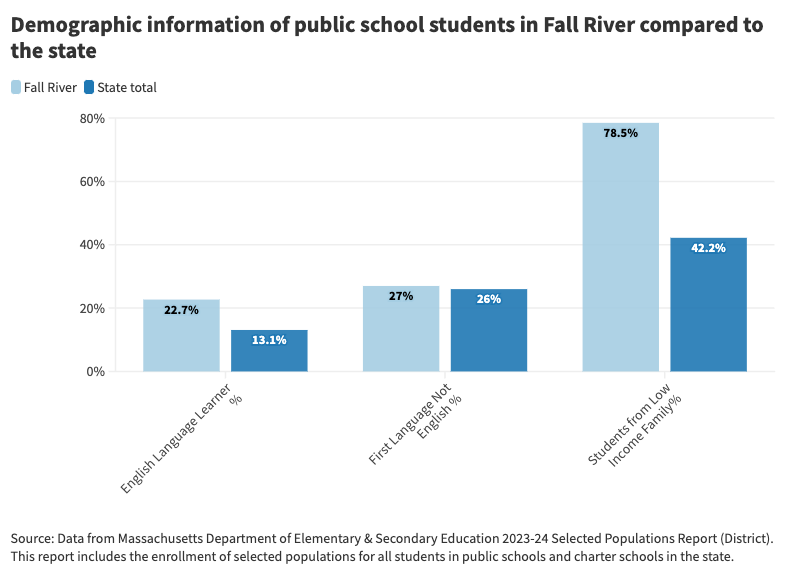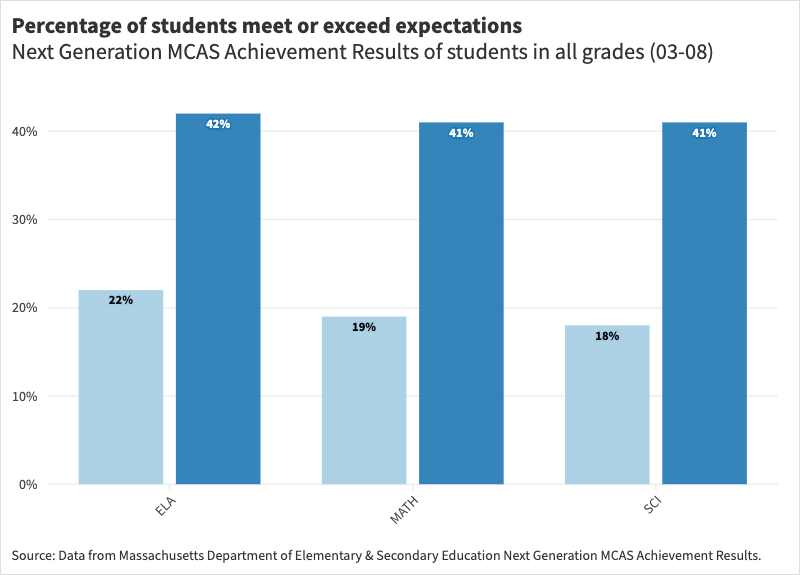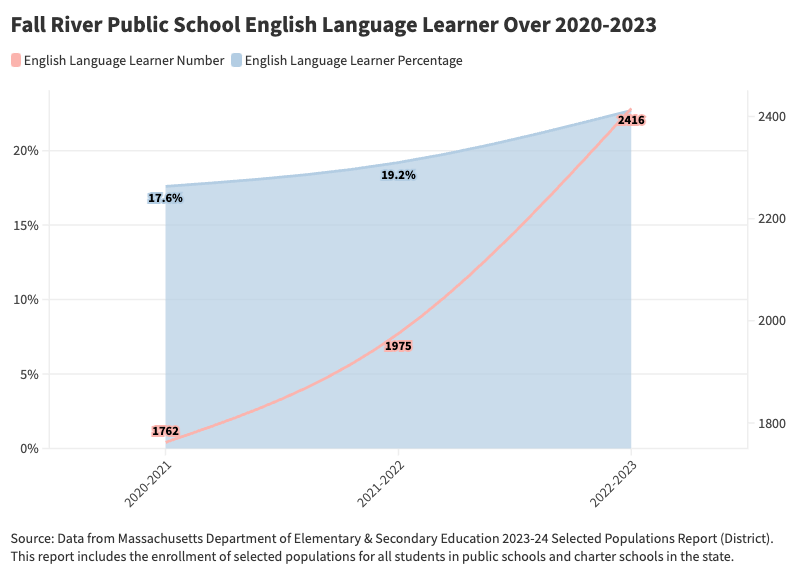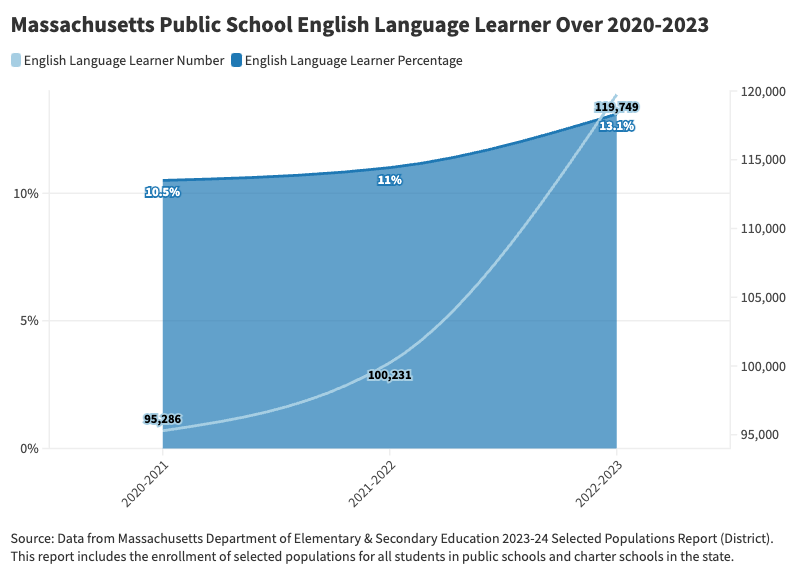Massachusetts educators argue students better off without MCAS graduation requirement
FALL RIVER — Some Fall River teachers and educators are calling for eliminating the Massachusetts Comprehensive Assessment System as a high school graduation requirement, arguing alternative assessment methods will help to narrow down educational inequality and fit communities' current needs.
Advocates have filed a ballot question to replace the MCAS graduation requirement with an alternative assessment tool that allows school districts to determine whether students' competencies fit state standards.
"Having relative success on the MCAS is a convenient excuse for high tests for districts to mask or avoid the challenges they have," said Paul Tritter, the director of professional learning for the Boston Teachers Union.
He said that the current accountability system under MCAS requirements "intended to close achievement gaps has made them worse."
"MCAS doesn't measure the students' achievement," said Keith Michon, the president of the Fall River Educators Association. "It measures their socioeconomic background. When you look from community to community, the high-scoring districts are those the ones that are more affluent, the low-scoring districts are the ones that are less affluent."

Fall River statistics
In 2023, 78.5% of students enrolled in Fall River's public schools are from low-income families, while the statewide percentage is 42.2%.

According to its 2023 Next Generation MCAS Achievement results, Fall River's MCAS performance has fallen behind in every subject compared to the statewide average, with 22% of students in all grades tested meeting or exceeding expectations for the proficient level for English language arts; 19% meeting or exceeding the math level; and 18% meeting or exceeding the science and technology/engineering level. The state rate of meeting or exceeding expectations in those subjects exceeds 40%.
Alternatives needed
Across the state, advocates are trying to find alternatives that help schools educate students in a way that suits the needs of individual communities.
Massachusetts Consortium for Innovative Education Assessment, a partnership of eight public school districts, promoted an alternative system to evaluate students and schools.
MCIEA held a Statehouse briefing recently to explain how the new system will benefit local students by providing a more performance-based assessment while considering community settings.
"We are not calling for no accountability at all," said Tritter. "We are calling for real accountability to schools for the families."
According to Dan French, the executive director emeritus of the Center for Collaborative Education, the performance-based assessment can train teachers to be experts in assessing students while cutting the current $30 million budget for outside test makers and administrators.
"If we did more assessments that were district-based, where teachers were reporting the achievement of their students according to performance-based tasks," "it will cost less than a big comprehensive test, which is very expensive," Michon said.
ART: UMass Dartmouth 'monster' sculpture, made of 32,000+ nip bottles, has a message
Rep. Alan Silvia, D-Fall River, who backs eliminating the MCAS graduation requirement, said the exam had put too much stress on the students and would help more students stay in school.
According to the 2021-2022 dropout report, the drop-out rate in all grades in Fall River is 6.7%, compared to the 2.1% drop-off rate statewide.
Michon said students may get discouraged with MCAS as a graduate requirement and drop out in their early years.
"When they're in 8th or 9th grade and haven't passed the test yet, they may drop out thinking, 'I am not going to graduate anyway,'" Michon said.
"If we were to eliminate MCAS it would give some teachers the ability to address their students' need in front of them, and not what is being assessed, which isn't always the same thing," he said.
Thrive Act bill filed
Advocates, including the Massachusetts Teachers Association, have filed a bill known as the Thrive Act to eliminate the test's high-stakes elements as a graduate requirement while keeping MCAS testing.
Rep. James Hawkins, D-Attleboro, who filed the bill, expressed concern about migrant students taking the exam during the enrollment process amid the ongoing migrant crisis.
According to Hawkins, taking MCAS posed a challenge for children whose families had just arrived in the country. They were required to take the test to determine their capacity to enroll in the school.
"How can someone that has only been here for 10 weeks take tests about the knowledge required to study here for 10 years," he said.

With the surge of the migrant population, Massachusetts has seen a continuous increase in the percentage of English language learners in its student population, with the percentage rising from 11% to 13.1% over the past three years.

As of 2024, 22.7% of Fall River's public school students are English language learners.
According to Michon, while the community will benefit from having different types of people speaking other languages and having different cultural experiences, it is a disadvantage when it comes to test-taking.
"Non-English speaking immigrant students are at a disadvantage when they come into our schools without a full grasp of the language," Michon said. "Then they're required to take common-language-only tests, sometimes a very short time after arriving, which doesn't allow them to show their best understanding."
Since 1993, the MCAS test has become a standardized graduate requirement for students under the Mass. Education Reform Law.
According to the Massachusetts Department of Elementary and Secondary Education, MCAS has helped the state provide higher standards for students to graduate and equip them with basic reading and math skills needed to succeed.
Today, Massachusetts students ranked first in the country in reading and math.
The Thrive Act is currently before the Legislature's Committee on Education. Supporters are also trying to collect signatures from communities around Massachusetts for a ballot initiative to be placed before voters.
This article originally appeared on Standard-Times: Fall River educators support bill to change MCAS graduation requirement

